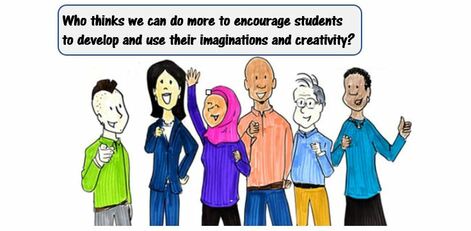
I had recently read an article in the Journal of Creative Behaviour, which proposed a Socio-Cultural Manifesto for the purpose of advancing theory and research in the field of creativity studies (Glaveanu et al 2019). It set out a number of propositions or beliefs about creativity held by the signatories and briefly explored the implications of these for researchers in this field of study. I found the document useful to test my own views on creativity and it was gratifying to discover that my own explorations of the meaning and practice of creativity are closely aligned to the socio-cultural perspectives offered in the manifesto.
Manifestos are common in the field of education. They are a public declaration of aspirations for a different and better educational future. Such documents identify and justify concerns, new needs and interests and propose changes to current practice. They provide a platform around which interested practitioners and institutions can discuss what matters and what they care about.
The need for higher education to pay more attention to the growth of imagination and the creative development of learners has been recognized for many years. As we get deeper into the 21st century the future has turned out to be even more uncertain, turbulent, challenging and disruptive than we ever imagined at the start of the millennium. An education system that does not commit to the development and recognition of learners as whole, imaginative and creative beings is not enabling them to prepare themselves for a future that none of us can imagine.
I felt we needed a meaty project to rebuild our community so I approached Chrissi Nerantzi and Gillian Judson to see if between us we could coordinate a discussion to develop a manifesto to Advance Imagination and Creativity in HE Learning and Educational Practice. The Manifesto, and some of the related discussions, will be published in the April issue of Creative Academic Magazine (CAM#13) during World Creativity and Innovation Week (April 15-21, 2019). This will be our collective contribution to this important annual global event.
To seed the discussion I produced three papers, created a structure and identified some key questions that we needed to address.
Q1 What are the most important reasons for why higher education needs to encourage and enable learners to develop and use their imaginations and creativity and invest in educational practices that encourage and facilitate such development?
Q2 Is the assumption that higher education could do more to encourage and enable learners to develop and use their imaginations and creativity, correct? If it is, what is the nature of the problem relating to imagination and creativity in higher education?
Q3 What does being creative mean in different disciplinary contexts? What might we mean by enabling learners to develop and use their imaginations and creativity in different higher education contexts? From an HE perspective, what are the most useful constructs?
Q4 What are the important values, propositions and principles that need to underpin such a manifesto to encourage higher education to invest in educational practices that facilitate the development and recognition of learners’ imaginations and creativity?
Q5 What actions might be undertaken at the level of individual practitioner, department/ subject group, institution and whole system, to realise aspirations contained in the manifesto for a more creative future?
Background reading
Glaveanu,V.P., Hanson, M.H., Baer, J., Barbot, B., Clapp,E.P., Hennessey, B., Kaufman, J.C., Lebuda, I., Lubart, T., Montuori, A., Ness, I.J. Plucker, J., Reiter‐Palmon, R., Sierra, Z., Simonton, D.K., Neves‐Pereira, M.S. and Sternberg, R.J. (2019) Advancing Creativity Theory and Research: A Socio‐cultural Manifesto Journal of Creative Beahviour 1-5 23 January 2019 Available at:
https://onlinelibrary.wiley.com/doi/full/10.1002/jocb.395?fbclid=IwAR1OpJ2bmqneyQJECMchh7OpBHGRhg6e0ueTDZIz7mdXJHZ470xStsxpJUU
Jackson, N., Oliver, M., Shaw, M., & Wisdom, J. (Eds) (2006) Developing Creativity in Higher Education: An Imaginative Curriculum. London: RoutledgeFalmer.
Jackson N J (2008) Tackling the Wicked Problem of Creativity in Higher Education Surrey Centre for Excellence in Professional Training and Education Available at:
 RSS Feed
RSS Feed